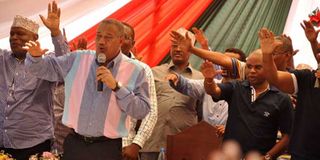Premium
Coast governors reveal grand plan on future of six counties

Coast leaders at a public rally to sensitise residents on the proposed Jumuiya ya Kaunti za Pwani at the Mkunguni Square on January 18, 2015. PHOTO | GALGALO BOCHA | NATION MEDIA GROUP
What you need to know:
- The governors have sponsored a Bill — the Jumuiya ya Kaunti za Pwani Bill — which they said will be tabled and debated in all the six county assemblies on February 24, 2015.
- The economic bloc seeks to bring together Mombasa, Kwale, Kilifi, Lamu, Taita Taveta and Tana River counties.
- Jumuiya ya Kaunti za Pwani will be officially launched on March 28, 2015 at the Mombasa County Stadium.
- Mr Joho said they would deal with those opposed to the union by ensuring they lose their seats in the next elections.
The proposed economic bloc bringing together six counties will be a reality in a few weeks, three governors spearheading it said Tuesday.
The governors have sponsored a Bill — the Jumuiya ya Kaunti za Pwani Bill — that they said would be tabled and debated in all the six county assemblies on February 24 after it is first approved by respective county Cabinets.
In interviews with the Nation, the governors revealed their plan of action for the Commonwealth of Coast Counties (Jumuiya ya Kaunti za Pwani), saying that the proposed economic bloc will be officially launched on March 28.
BRING TOGETHER COUNTIES
The economic bloc seeks to bring together Mombasa, Kwale, Kilifi, Lamu, Taita-Taveta and Tana River counties.
The proponents of the union have said that the main agenda of the group is to economically empower the coastal people for self-reliance and improve their living standards.
A statement from the office of Mombasa Governor Ali Hassan Joho, said a meeting of all county executives and ward representatives (MCAs) will be held in Taita-Taveta on February 6. The aim of the meeting is to educate the grassroots leaders and the executives on what the new unity entails.
After the talks, the proposed Bill will be sent to all the county assemblies for debate on February 24 after approval by respective county Cabinets.
For about three weeks starting on February 14, residents of the counties will give their views on the Bill in their respective counties during public sessions to be led by MCAs and other officials.
The governors behind the push envisage that the county assemblies will formalise the bloc by approving the Bill on March 19.
Once this is done, the Jumuiya ya Kaunti za Pwani will be officially launched on March 28 at the Mombasa County Stadium.
The governors and other political leaders from the region addressed their first rally on the new movement in Lamu Island from where they warned their colleagues opposed to the idea that they should be prepared to lose their seats during the next general election. The leaders also signed an agreement of commitment to the union.
Governors Joho (Mombasa), Amason Kingi (Kilifi) and Issa Timamy (Lamu) said any elected leader who is opposed to the Commonwealth of Coast Counties should be prepared to face the wrath of the electorate.
DEAL WITH OPPONENTS
Mr Joho said they would deal with those opposed to the union by ensuring they lose their seats in the next elections.
“We shall face them and find alternatives in their constituencies so that we can find leaders who are willing to drive the economic agenda of the region. We will not be begging,” Mr Joho said.
The three governors, however, said the proposed commonwealth was not a political outfit but a vehicle that would transform the Coast region’s economy.
“This is not a political party. It is a tool for economic transformation.
"Whereas a political party is a vehicle to help leaders ascend to power, Jumuiya ya Kaunti za Pwani is a tool we will use to bring food to the table of coastal people,” said Mr Kingi.
The governors announced that they had registered a regional development bank to cater for the financial needs of the residents of the six counties.
The institution, known as the Coast Development Bank Limited, is headed by Pwani University Vice-Chancellor Mohammed Rajab.
It is awaiting approval from the Central Bank of Kenya before it can officially start operations.
A technical committee chaired by Kwale Governor Salim Mvurya was also mandated to work on issues of funding and creating structures for different organs that will ease the establishment of the commonwealth.
In the past, attempts by politicians to form Coast-based parties or to campaign for greater autonomy of the region did not bear fruit.
In the recent past, some leaders have said that the region will put forward a presidential candidate in the next general election.




